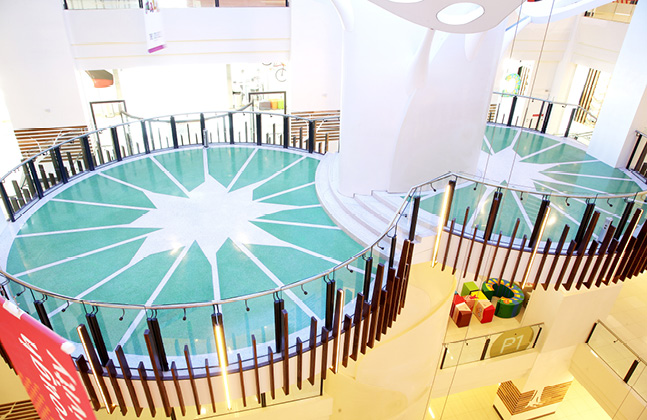1. Concrete cracks and chips
Spider cracks from accidents, dropped items and general wear and tear are commonplace with polished concrete surfaces, rendering them unsightly whilst also making them difficult to clean. With deeper, more severe cracks the floor may need to be injected with costly resin for repairs to avoid the build-up of dirt, dust and other contaminants.
Resin flooring offers seamless applications with superior strength and flexibility, allowing compatibility with coving and drainage without compromising the integrity of the floor. The high tensile strength and resistance of resin flooring ensures protection against scratches and damage, resulting in a durable, completely crack free surface.
2. Resin flooring is twice as strong as concrete
Due to the way that resin flooring is chemically fixed to the substrate below, resin floors are extremely robust, withstanding sustained pedestrian and vehicular traffic, heavy loads and general abrasion to deliver a hardwearing flooring solution that stands the test of time.
What’s more, the resilience of resin flooring dissipates any stress on the floor, increasing the load-bearing limit of the substrate below, ideal for more demanding processing and production environments within the industrial sector.
3. Concrete can be slippery
Even with anti-slip conditioners, concrete simply doesn’t compare to resin flooring when it comes to offering exceptional slip resistance underfoot. The re-application of the conditioner to the concrete surface is periodical, lengthening maintenance regimes for facilities managers.
Resin floors allow a variety of aggregates to be broadcast into the mix, significantly boosting traction underfoot whilst adding a unique aesthetic, providing attractive and safer flooring. Despite the additional aggregates, the application remains seamless, enabling easy and low maintenance cleaning schedules.
Resin flooring is also waterproof and levelled to prevent the pooling of water. Thanks to their compatibility with coving and drainage, resin floors are perfect for areas subject to sustained, heavy spillages or tough cleaning regimes.
4. Concrete is weakened by chemicals
Whether in a commercial or industrial environment, from aggressive cleaning agents to sugars and fats, aggressive substances will come into contact with the flooring. When exposed to severe substances, the integrity of the concrete is lessened, with localised areas of the concrete appearing noticeably different after spillages.
Resin flooring can be tailored to the exact requirements of each application, offering high chemical resistance from a vast range of substances ranging from oils and acids to petrol and bleach. The high levels of chemical resistance work tirelessly to ensure a vibrant, reliable finish is maintained.
5. Resin floors have unlimited design potential
Concrete can be incredibly dull, has a limited colour pallette and delivers inconsistent finishes. If the same procedures are not followed each time the concrete mix is made, the outcome will vary hugely, making uniform floor finishes near impossible.
The colour possibility of resin flooring truly is endless, allowing customers an unrivalled level of creativity and flexibility through their chosen resin system. A huge range of aggregates ranging from sparkling crystal to glass, granite and stone can be added to resins to create seamless terrazzo or natural stone carpets; stunning finishes that create the ultimate wow-factor underfoot.
With aggregate-based systems, brass or aluminium trims can be used to draw out patterns and shapes on the floor, to which the resin mix is then added in contrasting colours, creating a unique, contemporary design.
No other flooring material allows a brand so much opportunity to personalise their flooring.
2 thoughts on “Five Reasons Why Resin Flooring is Better Than Polished Concrete”
Comments are closed.








Goog points. Resin floor are the best i think because they don’t get damaged by chemicals en other dirt from outside. Really reliable floors.
Polished concrete is a highly versatile floor choice, but requires skill and care for installation as it is a craft, not a product. To ensure the success of the flooring, the designer should begin with a strong specification and demand results.